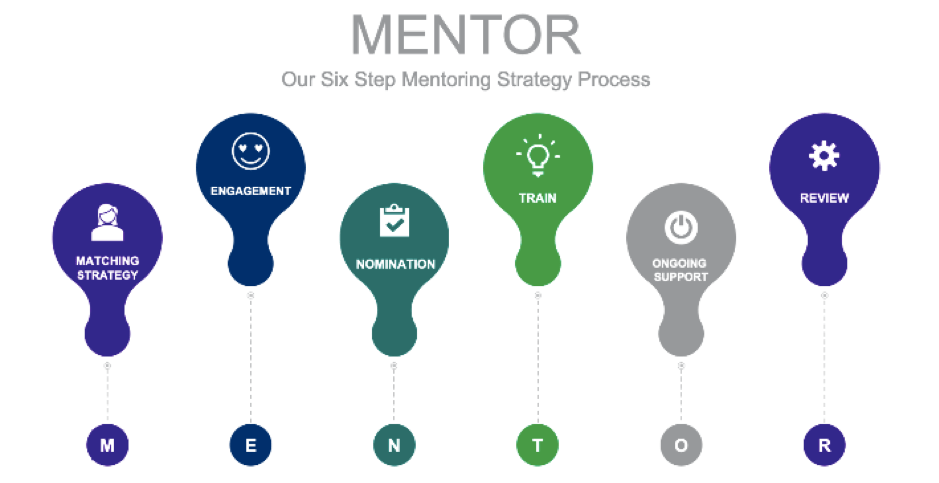This blog post continues our series, A Year in the Life of an Organisation’s Mentoring Programme. Team AO are working with a worldwide organisation to implement a programme of mentoring to develop the careers of junior female scientific researchers. In this series of blog posts, I am sharing with you how we went about delivering the project. Focusing here on how to get mentors and mentees excited about your mentoring programme, driving it forward and getting people involved.
In the first blog post in the series, I introduced you to the Mentoring Programme and our MENTOR model.
I also described how we developed a strategy for success with the organisation. That included the success criteria against which we could review and evaluate the programme. We used these criteria to communicate our call to action to our audience.
In the second blog post in the series, I talked about how we engaged participants in the Mentoring Programme.
In this, the third blog post of the series, I will look at how we encouraged employees to nominate themselves to be mentors and mentees. I will describe how we created the motivation to get involved in spite of the busyness of these challenging times.
I will also talk about how we selected the right mentors and mentees from those that applied.
Step 3: Nomination. Putting your hands up to get involved in a mentoring programme
People will have different motivations for getting involved in a mentoring programme. Your nomination and selection process should inspire interest and explore these motivations.
We used a webinar, Is Mentoring for Me? As a way to inspire our target audience to get involved and to consider how they would take advantage of this opportunity for themselves.
During the webinar, we paused to consider the benefits of mentoring for both the mentor and the mentee. In doing this, it was clear that both the mentor and mentee can gain from a truly symbiotic experience.
We have stepped on the first rung of the ladder, what next?
Many people do not think that they could have anything to offer as a mentor. It is hard to put your hand up and volunteer to be a mentor and much of this is due to our Ego. Many of us lack the confidence to stand up in front of our peers and say, “Yes, I have something to offer you!”
So how did we build confidence in our attendees to put in an application to mentor?
Well, first we showed them that many of the essential skills in mentoring are things they know already. We use these skills of empathy, active listening, sharing and support on a daily basis with family, friends and at work. Attributes that we know we can do will help to build confidence.
We showed them that there are ‘tools of the trade’ they can use to help them to be great mentors and that they can learn these behaviours and skills.
Team AO’s mentoring framework
At Team AO, we use a great framework for mentoring that is simple to learn and use at any stage of the mentoring process. Underpinning our framework are key principles such as a solution focussed approach. And each stage of the framework is supported by tools and techniques that help the mentor and mentee to arrive at a positive outcome. We give our potential mentors and mentees a taste of these with a promise we will build on these later. Sharing this helped to build confidence.
We also gave our potential candidates a purpose for putting themselves forward. The organisation we are working with is clear that the aims of the mentoring programme are to support equality and diversity. They are providing mentors for their junior female researchers to help them progress in a large, complex organisation. Mentors who have ‘been there, seen it, done it’ will have much to offer those starting out in their careers. Having a reason for volunteering your skills as mentor will boost the motivation to apply.
These steps supported our candidates to dig deep, step out of their comfort zones and to apply to become a mentor.
“When you spend time stepping outside your comfort zone two amazing things happen. First, you become like a magnet – attracting people into your life who can help you fast track and accelerate the journey towards attaining your goals both personally and professionally. Second, you help others to grow, whether conscious or unconsciously you become a role model, a mentor, a coach. You become a flashing beacon for others to follow and aspire to and making a positive impact on the lives of others is an incredibly fulfilling and worthy goal.”
Royston Guest
Mentors and Mentees – Catch them quick!
Your approach to application and selection tells candidates so much about the organisation they work in. A quick skim through LinkedIn will give you the evidence you need to show how important an honest and respectful approach to application and selection is. It is fundamental to the motivation of people and to the integrity of the organisation.
Speed is of the essence here. You have spent much time and effort in creating and inspiring a desire to get involved. Motivation is a fickle friend, is easily lost and time is its enemy.
Once we had completed the webinar, we sent out an immediate email to thank participants and give them a link to the application. Applications should not be onerous, difficult or unnecessarily intrusive. We designed a simple survey style application to give us the information we needed for selection. The longest question we asked was for a simple statement to share with us their motivations for applying.
Our timeline was:
- They had 2 weeks to complete and return the survey
- We spent a further 2 weeks reading the applications, selecting a shortlist and presenting this to our stakeholders
- Final decisions were made and we informed applicants within a week
This took place over the Winter Holiday and with many involved taking a long and well-earned break. It was a push, but so worth the effort. We had just a 6% drop out rate from application to onboarding.
Tell them quick!
Selection decisions should be straight forward if you are clear about the criteria for success. That is why those initial conversations with your primary stakeholders are so key to the success of the whole programme. Clear criteria, shared with applicants, helps to create a fair, consistent and transparent process.
We informed each applicant if they were successful or not quickly and with respect. This means each applicant received a personal email to let them know the outcome and next steps. These applicants are the leaders of the future. An honest and respectful response will motivate them to get involved in future programmes.
So, the programme continues on apace, now we have our mentors and mentees. We have invited them to their onboarding training, and I will share that with you in the next blog of the series – the T in our MENTOR model.
In the meantime, I am using the matching strategy and selection criteria to match mentors with mentees. We will introduce them to each other as soon as they have completed their training. As our poll showed us, they are raring to go and we don’t want to hold them up!
Find out more about our MENTOR Model and empowering employees through your Mentoring Programmes. You may also like to download our free eBook M-Power. A Practical Guide to Mentoring in the Workplace which is part of our suite of free and affordable resources that we hope will be of value to you.





1 thought on “How to Get Mentors and Mentees Excited About Your Mentoring Programme”
Thus has been a fabulous and exciting project to have been involved in and I have really enjoyed supporting Oona on this! The candidates are amazing – so dedicated and willing to learn as well as wanting to give back to their organisation and colleagues. Brilliantly designed by Oona and Antoinette with the organisation, and superbly managed by Oona. This blog is really the A to Z of how to put a programme together and keep momentum!